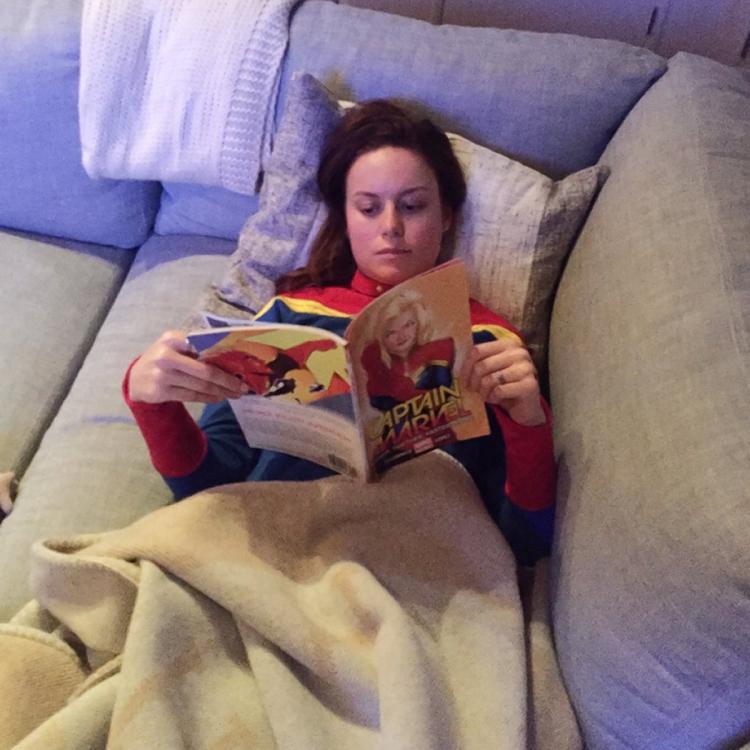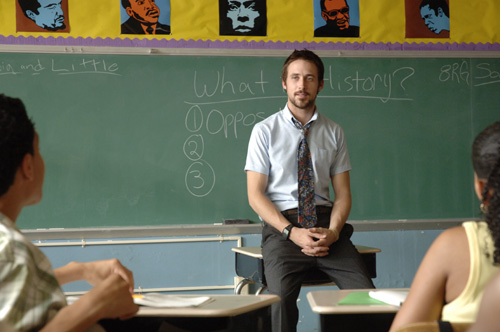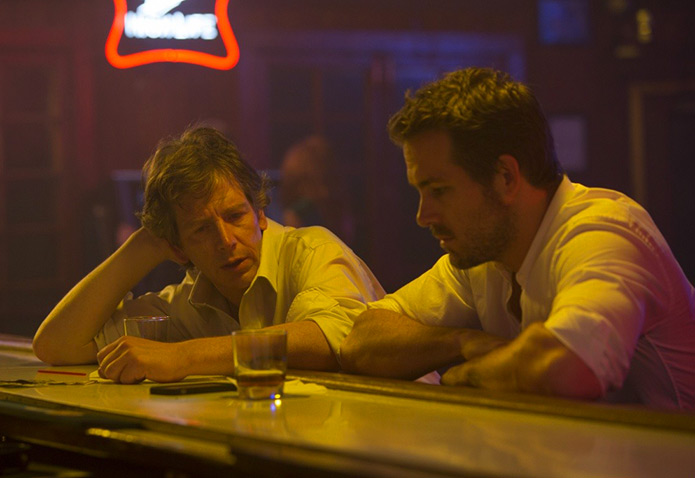
If Vegas oddsmakers cared about such things, I don’t think any of them would have even bothered putting Anna Boden and Ryan Fleck on the board for Captain Marvel.
To be sure, Marvel Studios has a history of making interesting choices when it comes to hiring their directors. Jon Favreau was an unlikely pick for Iron Man. Nobody could’ve imagined that Kenneth Branagh would even be interested in Thor. Before The Winter Soldier, the last movie Joe and Anthony Russo had under their belts was You, Me, and Dupree. Still, all of them showed genre chops in the past. For Favreau, it was Zathura. For the Russos, it was their work on Community. Branagh’s chops weren’t as apparent, but even before the film dropped, you could hear the basic idea behind Thor and think “I see why a Shakespeare guy would be down for that.”
That said, hiring Anna Boden and Ryan Fleck to direct a major tentpole superhero film is like getting Jenny Lewis to form an arena rock supergroup to play at Madison Square Garden. After you manage to convince yourself that it’s not a joke, the next question becomes “How does someone as introspective and particular as Jenny Fucking Lewis get interested in doing something big, catchy, and crowd-pleasing?”
Boden and Fleck got on the map by leading Ryan Gosling to his first Oscar nod in Half Nelson, a very loose, character-based narrative about a drug-addicted middle school teacher befriending one of his students, a prospective drug dealer. That was followed up by the acclaimed sports drama/immigrant tale Sugar, that ended up on AFI’s top 10 list for 2009. Their next film was an adaptation of Ned Vizzini’s It’s Kind of a Funny Story, a dramedy about a suicidal young man checking himself into a mental hospital. I’ve linked to their trailers; give them all a watch. Although Funny Story has more of a manic, cutesy pace to it, it’s not hard to believe that all of these movies were from the same directors.

Their latest is Mississippi Grind, starring Ben Mendelsohn and Ryan Reynolds. Released in 2015 by arthouse distributor A24, it’s about a degenerate gambler (Mendelsohn) befriending a charming drifter (Reynolds) in Iowa and setting off on a gambling tour down the Mississippi River in order to raise money to buy into a big poker game in New Orleans. They might have a little more money to work with than in the Half Nelson days, but their goals remain the same: sober narratives that reject easy sentiment and hinge on performances rather than plot turns. In this movie, Mendelsohn’s character takes a minor stab wound in an attempted mugging. Three different stories are told about that wound, each one deviating from the truth in a way that sheds light on the person telling the story. That’s the kind of movie Mississippi Grind is because that’s the kind of filmmakers Boden and Fleck are, and in the long, long list of concerns each Marvel movie has had to date, little things like that are near the bottom.
The cynical answer to “So what the hell is going on here?” is, of course, money. Everybody loves it, Boden and Fleck don’t have it, and even if they’re keeping themselves comfortable doing episodes of TV (Billions, The Affair, Looking, The Big C, In Treatment—all of them character-based shows, most of them set in their home base of New York City), movies like Mississippi Grind are only going to get harder to make without some name recognition behind them. I wouldn’t be shocked—or frankly, too disappointed—to learn that Boden and Fleck saw the writing on the wall, threw up their arms, and said “Screw it. Let’s do one for them.”

However, the love of money and brand recognition goes both ways, so the question becomes “How did Marvel land on a team with zero genre credibility that few people outside of arthouse audiences and NYC film enthusiasts really care about?” Granted, thanks to the tremendous bullshit that is the glass ceiling in Hollywood, the resumes for the other names that were thrown around weren’t much more impressive (in some cases even less so). Jennifer Kent was the hottest, thanks to the viral success of The Babadook, but she dropped out early, along with Kung Fu Panda‘s Jennifer Yuh Nelson. Of the directors on the final shortlist that was reported back in August, Lesli Linka Glatter was probably the best fit, with episodes of Homeland and The Leftovers under her belt. Niki Caro has little genre credibility, but she’s comfortable with mainstream drama and has a good relationship with Disney, bringing in McFarland, USA on a tight budget that allowed it to pull in some money and critical acclaim for them; she’s currently attached to the live-action Mulan remake. Lorene Scafaria and Rebecca Thomas were total wildcards with one major-ish release each to her name; Seeking a Friend for the End of the World and Electrick Children, respectively. Scafaria’s Seeking was genre-adjacent and had the broad, quirky sense of humor that the MCU likes to work with. I haven’t seen Electrick Children, but Thomas is clearly impressing people; she’s currently attached to Looking For Alaska (based on John Green’s book; the last two adaptations of his work made bank) and, surprise surprise, one of the other Disney animation remakes in development, The Little Mermaid.
Still, all of those filmmakers seem like people who are either comfortable with the grind of mainstream filmmaking or could learn to be comfortable. That’s not meant as a knock on their artistic prowess; if the Taikia Waititi-directed mid-credits scene from Doctor Strange taught us anything, it’s that a talented filmmaker can still leave their mark within the Marvel Studios system. However, you still have to play to the crowd, so to speak, and that doesn’t leave you a lot of room for naturalistic, dialogue-heavy scenes and measured pacing. Boden and Fleck have been doing this long enough to establish that the way they work is not necessarily out of constraint, but because that’s The Shit They Like. That Marvel Studios even took more than one meeting with them, presumably knowing that they can’t really afford to lose anyone else to creative differences right now, tells me something is up with Captain Marvel, something more than “The MCU is finally getting a female-led movie.”
After all, Brie Larson started getting really noticed for her work on Short Term 12 and won her Oscar for Room, both of which were the kind of character studies that Boden and Fleck like to make. And then there’s this quote from Kevin Feige:
“I think it’s possible to have more intimate movies after [Infinity War]…It never is intentionally about ‘being even bigger.’ Arguably, one of the biggest scenes we’ve ever had in a movie was the airport battle in Civil War, and there weren’t world-ending stakes in that scene…there was a conflict between the characters that made you feel something…To us, it’s less about continuing to go bigger with spectacle — although in some cases, we will — and more about continuing to go deeper with those character interactions.”
It’s absurd to think that Captain Marvel is actually going to be a reflective indie drama about a young woman trying to make her way in a complicated world as she comes to terms with the Kree being that is fused within her. The core of it is probably going to involve a lot of impressive fighting over a glowing doodad that has the power to remake or destroy the world, set to a big ol’ Brian Tyler score and hopefully laid against a strong emotional spine. Still, putting Boden and Fleck on the job gives everything around that core the potential to be very, very interesting. Wonder Woman is going to be the first major female-driven superhero movie (at least since Elektra) to go to theaters, but it seems like Captain Marvel is going to be important to the genre in a very different way.
But we’re not going to be certain about that for another two years. In the meantime, Mississippi Grind is currently available to watch on Amazon Prime, and the patient, open-minded viewer should definitely give it a spin.
